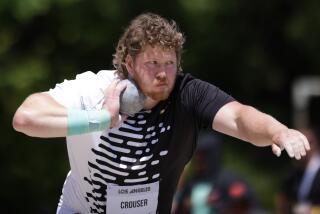Finally, Some Fun : Jumper Zhu Leaves Pressure Behind, Enters Cal State L.A.
- Share via
For Zhu JianHua, the 1984 Olympics in Los Angeles are remembered as dark days. It was then that the joy of competition and the appreciation of sports as a simple endeavor were taken from him.
Now, seven years later, he might have those feelings back, but he is not entirely sure.
In 1984, the Chinese Olympic team had encamped in the athletes’ village more than a month before the start of the Games. The team was insulated from the raucous international horseplay common to Olympic athletic dorms. Chinese officials served as a buffer between their team and the “distractions,” a Great Wall of somber suits lined up to keep out the rest of the world.
For Zhu, who was then the world record-holder in the high jump, the wait to compete seemed interminable. Track and field was one of the last sports on the program and Zhu was left to while his time away with Chinese officials who watched their prize athlete carefully. The rowdiness, the fun that Zhu saw going on around him as others made or renewed athletic acquaintances were not allowed him.
The pressure to perform--already great on his arrival here--was turned up every day. Zhu walked through halls where hand-lettered posters predicted his victory.
Everyone in the delegation was aware of the significance of these Games. China had not been in the Olympics since 1956. The return was to be perfect, the athletes excellent.
Zhu recalls “a lot of pressure and unnecessary influence.”
It seemed predictable, then, that Zhu would fail--if failure can be defined as a bronze medal.
That, however, was the definition adopted by Chinese officials, who set about dissecting every detail of Zhu’s performance.
Zhu found himself repeatedly explaining what had happened, adding human frailty into the sports equation. It was an unacceptable concept to many of his countrymen.
Why, they asked him, was it not possible to perform to perfection?
“The sports officials were not disappointed, they knew sports and what can happen,” Zhu said the other day. “A lot of people wrote to me and said, ‘Don’t worry, you’ll come back.’ Many others were disappointed. They didn’t understand how I could not have done well.
“Most people were disappointed with me. They don’t understand sports and they didn’t think I tried my best. They expected me to perform perfectly.”
The pressure on Zhu was heavier, and the failure perceived as greater, because of the Chinese system: His “failure” was failure for all Chinese.
“I represent China,” he said. “I represent the honor of the country. Indirectly, I represent the people. Sports are a projection of the people and the image of a country.”
This is what Zhu, 28, has traveled to Los Angeles to escape. He has enrolled at Cal State Los Angeles and will, if things go according to plan, compete this spring for the Golden Eagles’ track team. It has been a long journey from Shanghai to L.A., a journey Zhu has longed to take.
Marina Tse is a teacher in Monterey Park. In 1984, she served as deputy envoy to the Chinese Olympic team and befriended Zhu, whom she remembered for his gentleness and impeccable manners. Tse is Zhu’s interpreter.
Since 1984 they have remained friends and in 1987 Zhu told Tse that he wanted to retire from track and field. He told her that something he had seen during the indoor World Championships at Indianapolis impressed him.
He had watched another high jumper--like Zhu a former world record-holder--who had not jumped well during the competition. Zhu wondered how this would affect the athlete. He was astonished to see the jumper later, sitting in a bar with his coach and laughing. Having fun.
“This is nice,” he told Tse. “I wish I could have this. This way, there is not so much pressure.”
But that was not the Chinese way, so Zhu plotted his retirement, carefully, meticulously.
There are stories of sprinters running poorly, finishing the race and dropping their running shoes in a trash can near the finish line--instant retirement. That was not an option open to Zhu.
There are other stories of athletes in what was formerly the Eastern Bloc whose bodies were broken and who wanted to retire, of women who wanted to begin families. These top athletes were not allowed to retire until someone came up to take their place. That was Zhu’s option.
“I was thinking of stopping, but the officials asked me to continue,” he said. “They wanted me to try to go ahead. The system is different. If there is a need, I have to fulfill it. I have to go forward. Even if I have to (tape) my legs, even if I knew I was injured. If there is a need, I will try my best.”
It was not merely a case of Zhu tiring of jumping. His body was tired of jumping. He had been at it since he was 10, having been selected for the event because of his height, which is now 6 feet 5 inches.
From the beginning, he jumped constantly, far more than Western jumpers would consider prudent. Many track theorists say that jumpers have only so many jumps in their legs. Zhu’s coaches didn’t subscribe to that theory. In China, a jumper must perform each time he is asked, and he must jump as well as he can each time.
Things were nearly perfect for a time. On June 11, 1983, Zhu set the world record at 7 feet 9 1/4 inches. That September, he raised it to 7-9 3/4.
The Chinese were elated but the track world was skeptical of an athlete who failed to perform at the same level outside his country.
Zhu, though, earned international acceptance when he again broke the world record with a jump of 7-10 in June of 1984 during a meet in West Germany. Two months later, he “failed” in the Olympics.
Injuries soon followed. That winter, he experienced pain in his left knee. It was an overuse injury known as jumper’s knee. The cure is rest. That was not allowed.
In 1985, Zhu experienced nearly constant high fevers and spent much of the year in the hospital.
In 1986, Zhu suffered a broken hand while playing volleyball.
In 1987, Zhu had recurring stomach pains. His self-prescribed remedy was a hot water bottle on his stomach. One day, it exploded, causing second-degree burns. He was out of training for four months.
By the time the Seoul Olympics came around in 1988, Zhu knew he was in no shape to compete. He was sent anyway because, officials told him, he was the only Chinese capable of winning a medal in track and field. Zhu attended the Games but did not jump.
And later that year, he applied to the Chinese sports federation for permission to retire. The response was that any athlete wishing to retire must not compete for two years. If he did that, then he could apply for retirement.
Zhu complied and in 1990 was given his permit to retire.
He then was eligible to apply for a travel permit and contacted Tse, who scouted American colleges on Zhu’s behalf. Although Zhu had invitations from many countries to train or coach, he had remembered how happy people in the United States seemed and he wanted to return.
Tse chose Cal State Los Angeles for many reasons. As a Division II school with no age restrictions, Zhu could enter as a freshman with four years of eligibility. The program is low-key. And, perhaps most important, the student population is one-third Asian and Zhu’s adjustment might be easier.
So far, though, it has not been easy for Zhu since his arrival last month. He does not speak English and is enrolled in a special, intensive language class that will prepare him, it is hoped, to attend school as a regular student in January. He misses his wife of six months, who remains in Shanghai.
On the track it has been difficult, too. He has been asked to quit his heavy smoking. He has done that, but he also is about 15 pounds overweight and it has been three years since he last competed.
Zhu knows he has another long journey ahead of him. But he says he is happy, at last, to do what he wants to do, even if it is difficult.
He tells a story about himself, laughing. Because he was the youngest of five children, he was spoiled. And as a child, he was prone to high fevers and developed asthma. He was not allowed to play outside and, to his delight, was excused from housework and chores.
“That is why I don’t know how to do anything now,” he said. “I can’t clean and I can’t cook. I never even cooked water in Shanghai. But I have just learned to cook noodles and soup.”
Sort of. Zhu lives in a dorm with another Chinese student, who does the cooking. While his roommate was out one day, Zhu decided he was ready to make soup on his own. Methodically, he assembled the ingredients. He boiled a pot of water and emptied a can of condensed soup into it. Then he carefully added a whole potato and a whole carrot. Then some noodles.
Zhu broke into a wide grin.
“This is what I want,” he said. “No pressure. To be happy and enjoy my life.”
Perfect.
More to Read
Go beyond the scoreboard
Get the latest on L.A.'s teams in the daily Sports Report newsletter.
You may occasionally receive promotional content from the Los Angeles Times.







